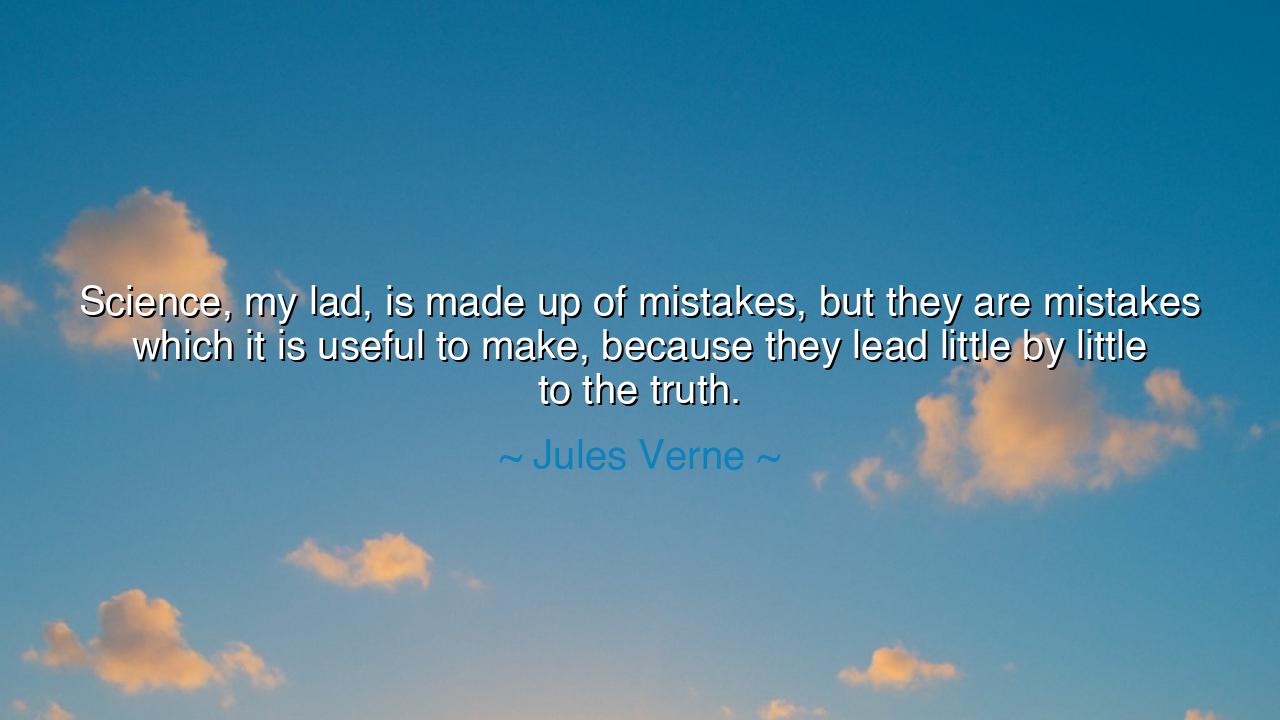
Science, my lad, is made up of mistakes, but they are mistakes
Science, my lad, is made up of mistakes, but they are mistakes which it is useful to make, because they lead little by little to the truth.






Jules Verne, the great dreamer who sailed beyond the seas of imagination, once declared: “Science, my lad, is made up of mistakes, but they are mistakes which it is useful to make, because they lead little by little to the truth.” These words, clothed in gentleness yet armed with power, unveil the very soul of discovery. For it is not perfection that builds the citadels of knowledge, but the stumbling steps of those unafraid to err, to fall, and to rise again. In this way, Verne speaks not only to scientists, but to all seekers of wisdom: the path of progress is paved with useful failures.
The ancients, too, knew this wisdom. Did not Aristotle say that the roots of learning are bitter, but the fruit is sweet? And did not the Stoics teach that error is the teacher of the wise, a crucible that tempers the soul? Verne, in his own way, continues their song, reminding us that mistakes are not shameful—they are necessary, even holy. To err in science is not to fail, but to move closer to the radiant flame of truth. Each misstep, each shattered hypothesis, is a lamp that illuminates the darkness and reveals the path ahead.
Consider the story of Thomas Edison, who sought to create the electric light. He failed not once, not twice, but thousands of times. Yet he spoke with the serenity of Verne’s wisdom: “I have not failed. I’ve just found ten thousand ways that won’t work.” And in those countless errors lay the secret of his triumph. The glowing filament that finally lit the world was not born of certainty, but of persistence through mistakes. Each wrong attempt was a stepping stone, each failure a torch that burned away ignorance until only brilliance remained.
We must also remember the voyages of Christopher Columbus, who sought a passage to India but instead stumbled upon the Americas. Though history rightly judges his legacy with complexity and sorrow, his journey reminds us of Verne’s truth: a mistaken path may still lead to a greater discovery than the one first imagined. Science and exploration alike are filled with such examples, where the intended destination was never reached, yet the unintended revealed treasures beyond measure.
Verne’s words carry also the breath of hope. For too often, men are crushed beneath the weight of their errors, ashamed to stumble in the pursuit of wisdom. But here the master of adventure reminds us: mistakes are not enemies but companions. They walk beside us like stern teachers, pointing us toward the truth little by little, step by step. To fear mistakes is to fear growth; to embrace them is to embrace the very heart of learning.
What, then, shall we carry from this teaching? That each failure is a gift, and each error a lesson. Do not curse your mistakes, but examine them, treasure them, and let them guide you forward. In your studies, in your labors, in your daily life—when you falter, pause and ask: “What has this taught me? What truth hides within this error?” In that question lies the secret power that transforms stumbling blocks into stepping stones.
So, my children of tomorrow, do not shrink from failure. Build your courage upon it. For the history of science, the history of mankind itself, is a story written in the ink of mistakes. To make them is human, to learn from them divine. And as Verne reminds us, these errors are not wasted—they are useful, sacred even, for they are the very road by which we draw nearer, little by little, to the eternal flame of truth.






AAdministratorAdministrator
Welcome, honored guests. Please leave a comment, we will respond soon